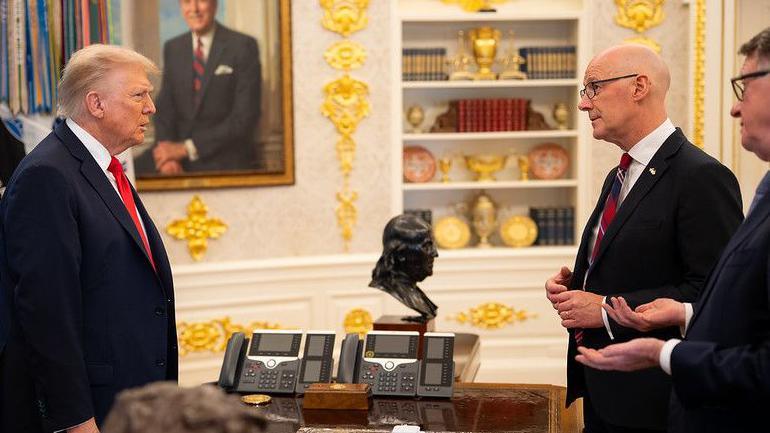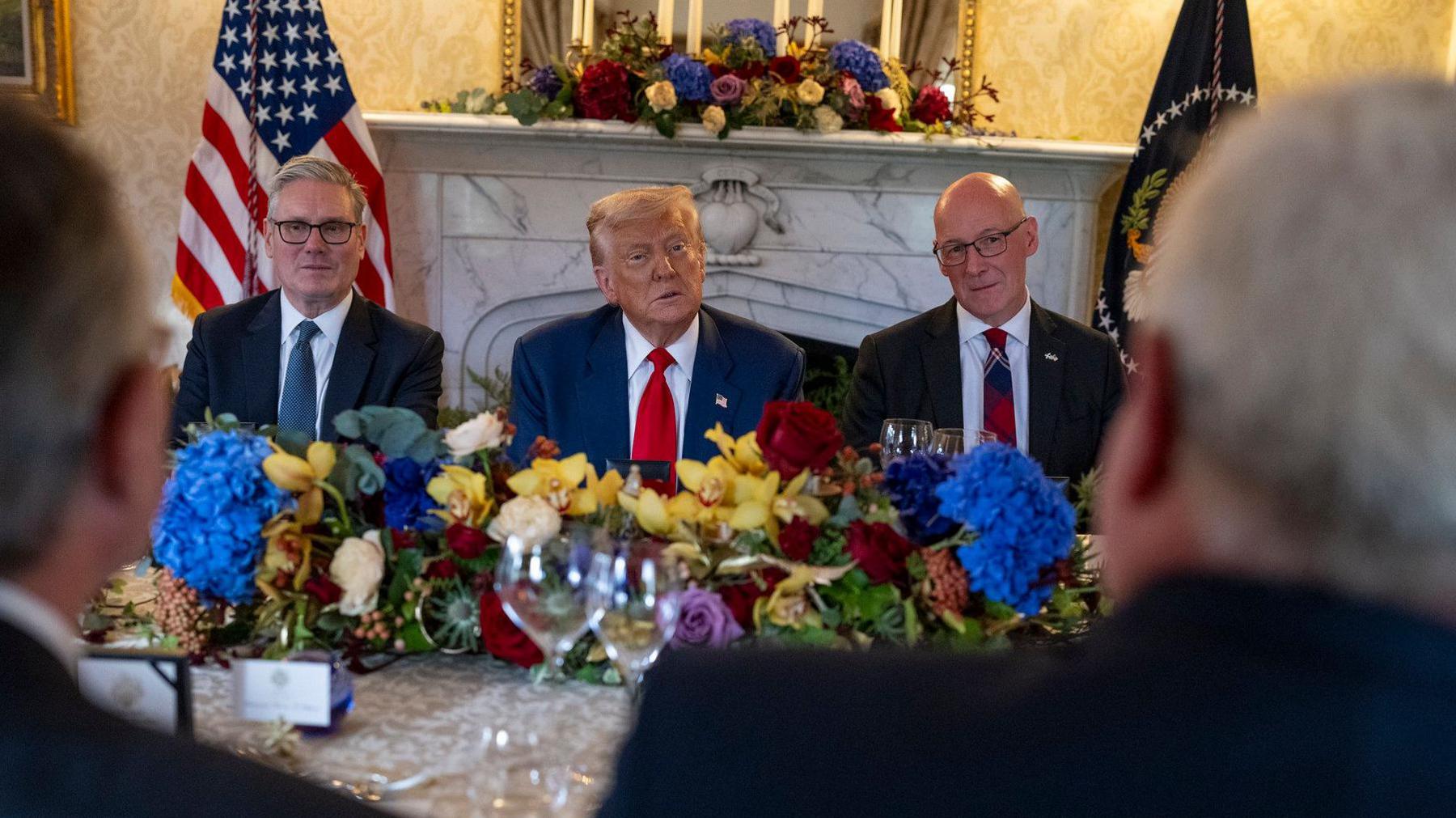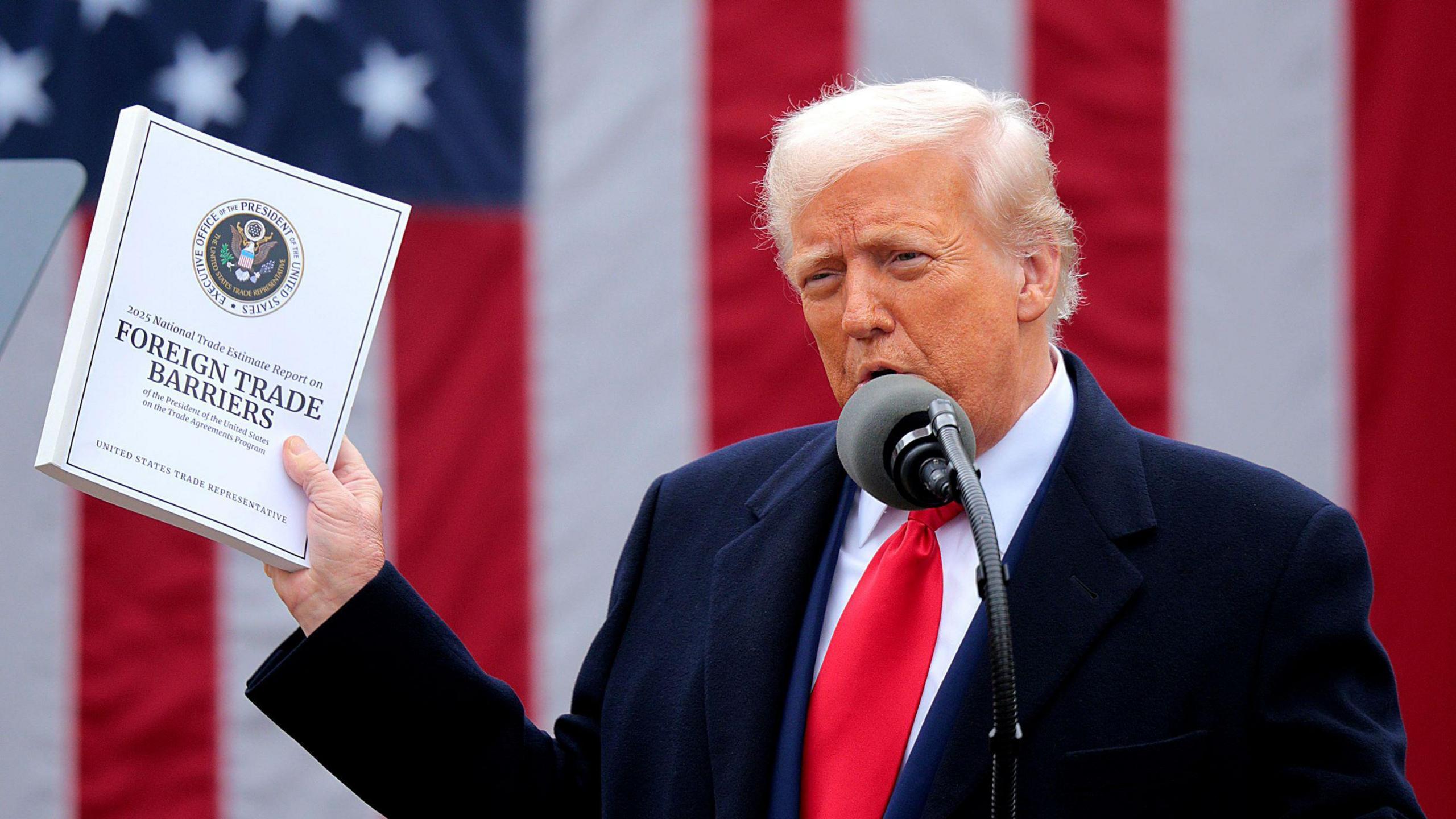Swinney and Trump have 'constructive discussion' over whisky tariffs

Donald Trump met John Swinney and Peter Mandelson in the Oval Office
- Published
First Minister John Swinney has had a "constructive discussion" with US President Donald Trump in the White House about tariffs on Scotch whisky imports.
Swinney is lobbying for the current 10% rate to be reduced or removed on the basis that it would benefit both Scottish and US distillers.
The Scotch Whisky Association (SWA) has said that the tariffs cost the industry about £4m a week and that their US counterparts are worried about the impact on their sales of bourbon barrels to Scotland.
The first minister believes there is a window of opportunity for discussion following his meeting with Trump in Aberdeenshire in July, and before the president's second state visit to the UK next week.
In an update posted on X, external after the meeting in the Oval Office, Swinney said he had spent the morning with representatives from whisky industries in Scotland and the US before meeting Trump.
He said: "We discussed how the zero for zero approach on tariffs would help the industry to flourish on both sides on the pond.
"I've now taken those arguments to the Oval office, to President Tump, and we had a constructive discussion about the reasons why Scotch whisky would benefit from no tariffs."
The meeting, which lasted around 50 minutes, covered a range of topics including the situation in Gaza and Israel's air strikes in Qatar.
It is understood that Swinney's lobbying efforts on this issue are supported by the UK government, which formally negotiates on trade policy with the US.
Prior to the meeting, the first minister met representatives of the SWA and Distilled Spirits Council of the United States.
John Swinney visits US for Scotch whisky talks
- Published9 September
Trump's trade war puts US love for Scottish goods to the test
- Published18 August
Earlier Swinney said: "When President Trump came to Scotland in July, we raised Scotch whisky with him and got it on the trade deal agenda.
"Now, with just over a week to go before the President makes a state visit to the UK, we have a critical chance to follow up and make the case for a better deal.
"Scotch whisky holds a unique position, as it can only legally be produced in Scotland.
"Scotch whisky and Kentucky bourbon have made common cause. This isn't a case of US business versus imports to the US. Both agree that they want no tariffs. That's a real strength.
"Today's discussions with the President are another chance to make that case and to fight for the very best deal possible for Scotland."

John Swinney (right) met President Trump and Prime Minister Keir Starmer (left) at the Trump resort at Balmedie in July
Swinney was accompanied to his Oval Office meeting by the UK's ambassador to the US, Lord Peter Mandelson, whose past friendship with convicted paedophile Jeffrey Epstein is in the media spotlight.
The first minister is also staying with Mandelson while he is in Washington DC.
Trump was expected to be accompanied at the meeting by the Secretary of State Marco Rubio.
On trade, the UK government has secured a 10% tariff arrangement on most UK goods entering the US.
That is 5% lower than what is applied to goods entering the US market from countries in the European Union.
Prime Minister Sir Keir Starmer and his team are seeking to negotiate further concessions.
Mixed messages
When Sir Keir appeared at the Trump Turnberry golf resort with the president in July, Trump said he did not realise whisky was an issue but agreed to discuss it.
After Swinney met the president at his golf resort in Aberdeenshire, the first minister said he had made the case for better trading terms for Scotch whisky.
But on his return flight to Washington, Trump played down the extent of these discussions.
It will become clear whether or not there is any movement on the existing US-UK trade agreement during the state visit, from 17 to 19 September.
Earlier, the first minister's spokesman refused to comment on whether Swinney was comfortable staying with Mandelson in light of the Epstein reports.
The spokesman also declined to comment on whether the first minister would raise the issue with Mandelson at a scheduled breakfast meeting.
The former Labour minister told the BBC that he "has long been clear that he very much regrets ever having been introduced to Epstein".
Swinney has already travelled to the US this year, visiting New York in April during the annual Tartan Week celebrations.
Trump's 10% tariff on whisky and most UK goods is paid by US importers, who often pass some or all of the extra cost on to their US customers.
The SWA, which is working with the equivalent trade body in the US, has said that about a fifth of all Scotch whisky is exported to the US.
The body said that market was worth £971m in 2024, and with the tariffs would cost the industry about £200m a year.
Earlier, SWA director Graeme Littlejohn said the tariffs also harmed the US bourbon industry, which exports casks to Scotland for whisky maturation.
Mr Littlejohn said that over the duration of Trump's second term in office, $1.2bn (£0.88bn) of old bourbon barrels were expected to be exported to Scottish distilleries.
He told BBC Radio's Good Morning Scotland: "We're seeing less Scotch whisky going into the market and we're seeing damage done to the industry.
"That means less trade to not only those cask manufacturers – those cooperages – but also to wholesale distribution and hospitality across the United States.
"Getting the tariffs back down to zero for Scotch whisky would obviously benefit Scotland and the industry directly, but it would also be a good thing for the US industry and for the US economy."
The SWA is also concerned about the reimposition of a 25% US tariff on single malt imports.
That was introduced in 2019 during Trump's first presidency.
It stemmed from a dispute between the US and the EU over subsidies given to rival airplane manufacturers, with the UK tangled up in the row as a former EU member.
Those trade barriers were estimated to have cost the Scotch industry more than £600m in exports before they were suspended for five years in 2021.
That agreement is due to expire in June 2026, with the SWA calling for the dispute to be permanently resolved to ensure the higher rate is not reimposed, potentially on top of the current 10% tax.
Related topics
- Published3 April
